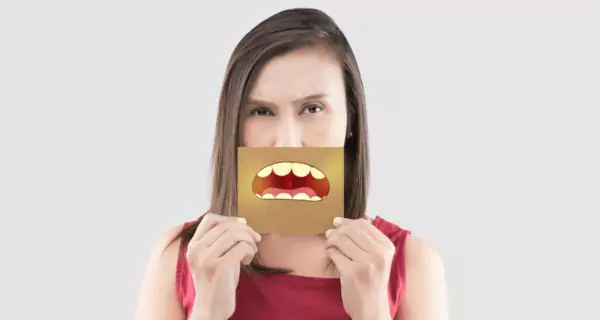Last Updated on: 19th September 2025, 12:29 pm
Relaxation exercises can greatly improve oral health. They help reduce stress-related habits, such as teeth grinding and jaw clenching. By incorporating daily relaxation routines, you can naturally protect your gums, jaw muscles, and overall mouth health.
We live in a fast world. Long work hours, many tasks, and daily problems make us feel stressed and anxious every day. This stress does not just affect our mind; it also affects our whole body, including the mouth.
Jaw tension, teeth grinding (bruxism), and gum problems are often hidden signs of chronic stress. Brushing and flossing are important, but taking care of your mind is also important for a healthy smile.
Relaxation exercises offer a simple, natural way to calm your mind, reduce stress-related habits, and protect your oral health. In this article, we will explain how stress affects the mouth and which exercises can help.
How does stress affect your mouth?
We often link stress to the mind and emotions, but it can also have a big impact on oral health. Stress can change your daily oral care habits, increase muscle tension, and make your mouth more vulnerable to infections.
What problems can stress cause in your mouth?
Stress can lead to habits and physical changes that harm your mouth, including:
- Teeth grinding (bruxism): many people grind or clench their teeth without realizing it, especially while sleeping. This can:
- wear down enamel
- weaken teeth
- cause cracks
- damage dental restorations.
- Jaw tension (TMJ problems): stress tightens jaw muscles, affecting the temporomandibular joint (TMJ). This can lead to:
- headaches
- jaw pain
- neck tension
- difficulty chewing.
- Gum problems: high cortisol levels generated from stress lower immunity and increase inflammation. It can make gums more prone to:
- infection
- bleeding
- gum disease.
- Dry mouth: Stress can reduce saliva flow, which normally protects teeth from decay and bad breath.
- Cavities: Skipping brushing or flossing and eating more sugary or processed foods under stress increases the risk of tooth decay.
- Mouth ulcers and cold sores: A weakened immune system may trigger painful ulcers or herpes labialis more often.
Why does stress increase the risk of oral problems?
Stress affects your body and mouth in multiple ways:
- Weakens the immune system: Your body is less able to fight bacteria and viruses, making infections more likely.
- Changes in oral care habits: Fatigue, anxiety, or emotional strain can make you skip brushing, flossing, or dental visits.
- Affects eating habits: Stress often increases cravings for sugary or processed foods, which harm teeth.
- Causes muscle tension: Clenching and grinding wear down teeth, strain the jaw, and may lead to fractures or long-term pain.
Managing stress with relaxation exercises, regular oral care, and a healthy diet can protect your teeth and gums. Paying attention to jaw tension, avoiding excessive sugar, and keeping up with dental visits helps reduce the oral effects of stress.
How can relaxation exercises help your mouth?
Relaxation exercises calm your nervous system and reduce physical tension. This has several direct benefits for the mouth:
- Stop teeth grinding and jaw clenching: Relaxed muscles make it harder to grind or clench teeth, protecting enamel and preventing jaw pain.
- Reduce gum problems: Lower stress and cortisol help gums heal faster and resist infections.
- Increase saliva: Saliva protects teeth by neutralizing acids. Relaxation can improve saliva flow.
- Support good oral habits: A calm mind helps you brush, floss, eat better, and go to the dentist regularly.
Relaxation exercises do more than make you feel calm; they physically protect your teeth, gums, and jaw.
What are the best relaxation exercises for your mouth?
These exercises are simple, easy to do at home, and directly help oral health. Each exercise relaxes muscles, lowers stress hormones, and supports good oral habits.
How does deep breathing help my mouth?
Deep breathing slows your heart rate and relaxes your jaw and facial muscles. This makes it harder to grind or clench teeth.
How to do it:
- Sit or lie down comfortably.
- Breathe in through your nose for 4 counts.
- Hold your breath for 4 counts.
- Breathe out slowly through your mouth for 4 counts.
- Repeat for 5–10 minutes.
Regular deep breathing reduces jaw tension and protects enamel, preventing damage from teeth grinding.
What is progressive muscle relaxation (PMR) and how does it help?
PMR relaxes the muscles all over your body, including the face and jaw. It lowers tension that can cause clenching and TMJ pain.
How to do it:
- Start at your toes. Tense each muscle group for 5 seconds, then relax.
- Move up through your legs, back, arms, and finish with your face and jaw.
- Pay extra attention to your jaw, tense and relax slowly.
PMR before sleep reduces nighttime teeth grinding and jaw discomfort.
How can guided imagery improve oral health?
Guided imagery uses your imagination to create calm and safe mental spaces. It lowers stress hormones, protects gums, and relaxes jaw muscles.
How to do it:
- Sit or lie down in a quiet place.
- Close your eyes and imagine a calm, safe place.
- Focus on details: colors, sounds, and smells.
- Stay in this mental scene for 5–10 minutes.
Guided imagery helps you feel calm and reduces muscle tension in your jaw and face.
How does meditation or mindfulness protect my mouth?
Mindfulness teaches awareness of your body and habits. You notice when you clench your jaw or grind your teeth, so you can stop it.
How to do it:
- Sit comfortably and focus on your breath or body sensations.
- If your mind wanders, gently bring your focus back.
- Practice 5–15 minutes daily.
Mindfulness helps you control harmful habits, protecting your teeth, gums, and jaw.
How can gentle yoga or stretching help my jaw and teeth?
Stretching relieves pressure on the jaw joints, neck, and shoulders. It improves posture and reduces TMJ discomfort.
How to do it:
- Try simple neck rotations and shoulder stretches.
- Slowly open and close your mouth to stretch jaw muscles.
- Repeat 5–10 times each.
Gentle stretching keeps your jaw relaxed, improves posture, and reduces jaw pain.
Practicing these exercises every day is helpful to protect your oral health, reduce discomfort, and keep your smile strong.
Why should you integrate relaxation into your oral health routine?
Combining relaxation exercises with daily dental care is good, because it treats the root cause and the symptoms of stress-related oral problems at the same time.
When you manage stress and maintain strong dental hygiene together, you create the best possible environment for a healthy mouth.
How can you make relaxation part of your daily routine?
Stress relief works best when it’s a daily habit, not just something you do when you feel tense. By making relaxation part of your schedule, you can protect your teeth, gums, and jaw every day.
Some tips for building a routine are:
- Set aside 10 minutes before bed: Use this time for deep breathing, meditation, or gentle stretching to relax jaw muscles before sleep.
- Pair relaxation with brushing your teeth: Doing both together creates a double benefit, cleaner teeth and a calmer body.
- Use reminders or apps: A simple phone alert or a relaxation app can help you stay consistent.
- Create a calming space: A quiet corner with soft lighting can make your relaxation exercises both more enjoyable and effective.
Daily consistency reduces jaw clenching, supports healthy gums, and helps prevent stress-related dental problems.
How can you combine relaxation with dental care?
Relaxation exercises give internal support to your oral health, but they work best when combined with regular dental habits.
Key habits to maintain:
- Brush twice a day with fluoride toothpaste.
- Floss daily to remove plaque between teeth.
- Schedule regular dental checkups to detect and treat problems early.
- Use a night guard if your dentist recommends it for teeth grinding.
Taking care of your smile while keeping stress in check makes everyday life feel lighter, more comfortable, and a lot more enjoyable.
Can relaxation exercises help with dental visit anxiety?
Yes, it’s common for many people to feel nervous before a dental visit. The relaxation tips we have talked about should help you feel calmer and more in control.
Before your appointment, you can:
- take slow, deep breaths
- relax your shoulders and jaw
- listen to calming music
- do a short meditation
- stretch your neck and back
Regular dental checkups keep your mouth healthy, and when you manage your stress, these visits can feel much easier.
How can a calm mind keep your smile healthy?
Your smile shows how you feel inside. Stress and worry can cause problems like teeth grinding, sore gums, or dry mouth.
Using relaxation every day can:
- help you feel calmer and less stressed
- relax your jaw and protect your teeth
- keep your mouth healthy for longer
Caring for your mind and mouth together gives your smile the best chance to stay bright and healthy.
Frequently Asked Questions
How can relaxation help my oral health?
Do I still need dental checkups if I practice relaxation?
Absolutely, relaxation supports oral health but does not replace brushing, flossing, or professional checkups. Both work together to protect your mouth.
What is a night guard and who needs it?
How soon can I see results from relaxation for oral health?
Can poor sleep from stress affect my teeth?
Yes, lack of sleep increases teeth grinding and jaw tension, which can wear down teeth and cause pain. Relaxation before bed helps improve sleep quality.
Voice and Search (Q&A)
Are there tools that help reduce stress-related dental problems?
Yes, night guards for grinding, soft toothbrushes for gentle brushing, and apps for relaxation or reminders can all help.
Does anxiety affect gum disease?
Yes, stress and anxiety can weaken your immune response, making it easier for gum inflammation or disease to develop.
Can meditation really stop teeth grinding?
It helps. Meditation lowers stress, which reduces jaw clenching and grinding, although a night guard may still be needed.
Share
References
1. Bishop, S. (2023, January 18). Understanding the relationship between bruxism and stress. Sleep Education. https://sleepeducation.org/understanding-relationship-between-bruxism-stress/
2. Chemelo, V. D. S., De Sousa Né, Y. G., Frazão, D. R., De Souza-Rodrigues, R. D., Fagundes, N. C. F., Magno, M. B., Da Silva, C. M. T., Maia, L. C., & Lima, R. R. (2020). Is there association between stress and bruxism? A Systematic Review and Meta-Analysis. Frontiers in Neurology, 11. https://doi.org/10.3389/fneur.2020.590779
3. Oral Health Foundation. (n. d). The Surprising Connection Between Low Mood and Oral Health. OHF. https://www.dentalhealth.org/blog/low-mood-and-oral-health
4. Vasiliou, A., Shankardass, K., Nisenbaum, R., & Quiñonez, C. (2016). Current stress and poor oral health. BMC Oral Health, 16(1). https://doi.org/10.1186/s12903-016-0284-y
5. WebMD contributors. (2025, August 4). How to Keep Stress From Wrecking Your Mouth. Web MD. https://www.webmd.com/oral-health/stress-teeth
-
Dr. Yeidy Carolina Mesa [Author]
DDS Yeidy Carolina Mesa Passionate Dentist | Advocate for Accessible Oral Health Education Graduating from Universidad CES in 2022, I am a dedicated general dentist with a lifelong passion for helping others and making a meaningful impact in the world. My journey into dentistry began at the age of 7, inspired by my own experience with braces and overcoming a fear of the dentist. This personal journey shaped my mission to help patients conquer their own dental anxieties and embrace a healthier,...
View all posts
-
Nayibe Cubillos M. [Medical Reviewer]
Pharmaceutical Chemestry |Pharmaceutical Process Management | Pharmaceutical Care | Pharmaceutical Services Audit | Pharmaceutical Services Process Consulting | Content Project Manager | SEO Knowledge | Content Writer | Leadership | Scrum Master
View all posts
A healthcare writer with a solid background in pharmaceutical chemistry and a thorough understanding of Colombian regulatory processes and comprehensive sector management, she has significant experience coordinating and leading multidisciplina...





















